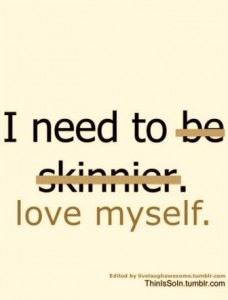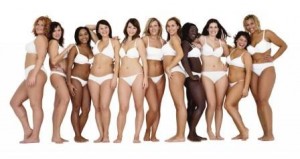Improving Your Body Image

As we get closer and closer to the summer months, more people want to start improving their body image. Shorts, skirts and tank tops leave little option for covering any ‘flaws’ and many begin setting goals for how they’d like to change their body.
This article was posted a week ago and I was interested to see the response. Many supported the article and others were very offended.
I read it and although I agree with some aspects, it does not account for genetic factors and individual differences. It is definitely true that some people have it a lot easier than others. They were born with better genetics, stronger metabolism, less fat cells etc.
Before setting any type of weight loss goal, it’s very important for you to examine your genetics and to understand that fat loss is dependent on your genetic breakdown.
Many researchers believe that approximately 50% of fatness is genetically determined. You can’t change this! Here are some stats to help you understand this relationship.
- If one of your parents is obese, you are 2x more likely to be overfat.
- If both of your parents are obese, you are 4x more likely to be overfat.
- One study also makes this relationship very clear. Overfat identical twins were fed 1000 extra calories per day for 7 weeks. You would expect that each pair of twins should gain the exact same amount of weight but in fact, the weight gain ranged from 9.5 to 29.3 pounds. It’s most interesting to note that although the actual range of weight gain between twins was very high, the twins in each pair gained exactly the same amount of weight demonstrating that genetics will play a large factor in your ability to achieve a certain body type.
It doesn’t mean you have to settle, you just have to understand that you may have to work harder than someone else and still may not be able to achieve a certain physique that someone else can easily achieve.
When someone really fit with a super toned physique looks down on someone who is overweight and judges them they are clearly negating the influence of genetics. It is all relative and I could turn it right back on these folks. For example, I could ask them why they are not in the Olympics or playing on a national level team or winning marathons or triathlons. I could suggest they are lazy and not training correctly and not eating the right foods. But clearly that is not the case. High level professional athletes often have a higher genetic potential that most of us could never aspire to. No matter how hard I trained, I’m never winning a marathon!! So we have to do our best to be OUR best and reach our own genetic potential.
You know in your heart whether you are at your best!! And we probably all could do a little better, myself included. I could be leaner and more cut but that would require me to be more disciplined with nutrition, but I like to drink wine a few times a week and indulge every once in a while. The sacrifice is not worth the reward to me and I love that I am fit enough to do whatever I want whenever I want and even though my body isn’t perfect, whatever that is, I’m very happy with it and what I can do and happy that I don’t have to be so OCD about my nutrition. So my belief is to follow the 80/20 rule and live life to the fullest!
So, here’s the bottom-line message. You have a choice. You can be in shape or out of shape. You can look YOUR best or look YOUR worst. Remember, 50% is out of your control–genetics-and 50% is in your control- exercise and healthy eating.
I prefer to focus on the doing…exercise, eat well, and things will take care of themselves. And I also agree that there is beauty in all sizes – just keep taking care of yourself!
But the problem is that people often have very unrealistic expectations of the type of body they would like to achieve. They often refer to popular magazines to determine their ideal body. But they may not realize that many of the models are 23% underweight to begin with, have been made-up for hours, camera tricks are used, and still, once the photos are developed, the pictures are cropped, airbrushed and manipulated by computer to produce a very unrealistic, unhealthy, so-called “perfect” image.
 What is sad are the people who get caught in the “Geez, if I could just lose this extra 10 pounds, then I’d be happy” syndrome, yet when they do lose the weight, they’re still not satisfied. If you believe that you’ll be happy once you lose the weight, you’ll never be skinny enough to be happy. It’s a vicious cycle and it never ends unless we learn to love ourselves right now, not tomorrow or next month or next year. It’s ok to want to make health improvements but you can’t hate and despise yourself. Making these lifestyle changes is about believing you deserve to be healthier! You deserve to take the time out to exercise and eat well. It’s not about making the changes so you can look like someone else. If you make changes with this as you ultimate goal, you will not succeed and you’ll be miserable for life! Take our word for it. We’ve seen it happen time and time again! Body hatred and dissatisfaction are hardly reserved for only the morbidly obese. In fact, many women who clearly have very little body fat to lose are not happy with their body proportions.
What is sad are the people who get caught in the “Geez, if I could just lose this extra 10 pounds, then I’d be happy” syndrome, yet when they do lose the weight, they’re still not satisfied. If you believe that you’ll be happy once you lose the weight, you’ll never be skinny enough to be happy. It’s a vicious cycle and it never ends unless we learn to love ourselves right now, not tomorrow or next month or next year. It’s ok to want to make health improvements but you can’t hate and despise yourself. Making these lifestyle changes is about believing you deserve to be healthier! You deserve to take the time out to exercise and eat well. It’s not about making the changes so you can look like someone else. If you make changes with this as you ultimate goal, you will not succeed and you’ll be miserable for life! Take our word for it. We’ve seen it happen time and time again! Body hatred and dissatisfaction are hardly reserved for only the morbidly obese. In fact, many women who clearly have very little body fat to lose are not happy with their body proportions.
Learning to love your body: Complete the following steps to help improve your body image and your health and fitness.
Step One: What’s realistic for you?
- Is there a history of excess fat in your family?
- Which parts of your body or your physical attributes are you satisfied with?
- What is the lowest weight you have maintained as an adult for at least one year?
- Based on your genetic predisposition, your age and the amount of time you want to spend exercising, what type of “ideal” physique is achievable for you?
Step Two: I need a little help from my friends!!
Surround yourself with positive, supportive, empowering people who will challenge you to be your best. Keep people around who are part of the solution not part of the problem.
Step Three: Be active everyday and make healthy food choices at least 80% of the time!
Step Four: Manage your thoughts:
One aspect of gaining control is understanding the role of negative and irrational thinking. We are often our own worst critics and can be so hard on ourselves. Here are some examples of things you may have said to yourself which can sabotage your efforts:
- I missed my workout. I’m a total loser!
- If I don’t starve myself I’ll get fat!
- Since I pigged out at lunch, the whole day is ruined. I might as well stuff myself today and start all over again tomorrow!
- Things always go wrong! I’m such a failure!
- It’s not the diet program that’s wrong, it’s me!
- I might have lost 10 pounds but I can’t go to the beach until I’m a perfect size 6!
- I’ll be happy once I lose the weight!
- My thighs are the fattest I’ve ever seen!
- If I lose weight, then my boyfriend will pay more attention to me.
- Why do I have such bad will-power?
- Why couldn’t I just have been born with a perfect body?
- I’ve got to lose 20 pounds within a month to get ready for my vacation or my holidays will be ruined!
- I’ll always be like this!
- I can’t seem to do anything right!
- Why would anybody love me?
When you find yourself saying things to yourself that you would never say to another human being, try the following:
- Listen to your thoughts at the times when you feel worst and listen for irrational/negative thinking.
- Dispute these thoughts by asking “Why is this so?”, “Where is this negativity coming from?” and “Could there be another possible explanation or interpretation?”
- Imagine repeating what you’ve said to a close friend or child? We could never imagine talking to others as we talk to ourselves. The next time you catch yourself thinking irrationally or negatively, ask yourself if you’d ever speak this way to another human being. You deserve the same type of respect you’d give anybody else! Remind yourself that if you continually practice negative self-talk, eventually, you may actually start to believe your own words. Your self-esteem can end up taking a real beating.
- Displace continuing irrational beliefs by techniques of
- Thought stopping (when worrying, think of a stop sign and then pleasant thoughts)
- Stress management (when worrying, participate in your favorite relaxation techniques like massage, deep breathing, reading, baths, journal writing etc.)
- Learn to live in the moment and to experience true joy in your life. Stop worrying about the past or the future.
- Each night before you fall asleep, make a mental note of what was the best part of your day or of something that you experienced that you really appreciated or enjoyed.
- Live today! Self-hatred takes a lot of time and energy. Obsessing about your body weight, nutrition plan and exercise program leaves you tired and depressed. Deciding to not enjoy the here-and-now because you’ve decided to wait until you lose the weight will leave you feeling deprived and will often lead to more negative feelings and behaviors. Remember that thin thighs, a small butt and a 6-pack set of abdominals is not the ticket to a meaningful existence. Fill your life with interesting experiences and people and you’ll enjoy a much higher quality of life.
Sherri McMillan, M.Sc. has been inspiring the world to adopt a fitness lifestyle for over 25 years and has received numerous industry awards including International Personal Trainer and Fitness Presenter of the Year. She is the author of five books including “Go For Fit – the Winning Way to Fat Loss” and “Fit over Forty” and is the featured presenter in various fitness DVDs. She is the owner of Northwest Personal Training in downtown Vancouver and can be seen running, hiking or cycling with her two children, Brianna and Jackson. She can be reached at www.nwPersonalTraining.com or www.ShapeupwithSherri.com
Note: As an avid Columbian reader, you can redeem a 2 week pass at her world-class training studio to help get you started. Contact 360.574.7292 for more details.

